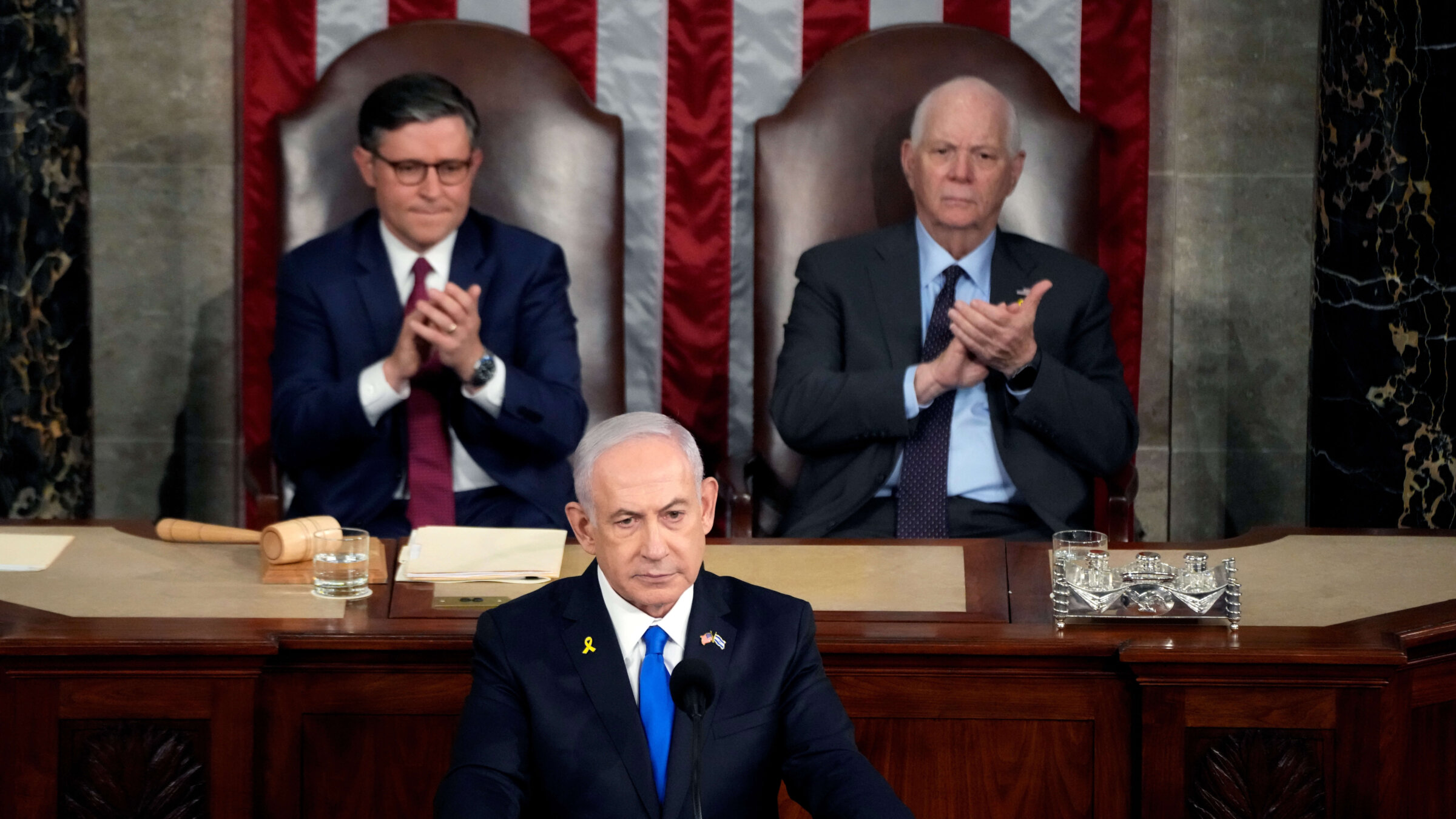Netanyahu’s speech proved it’s time for the U.S. to stop enabling him
The Israeli prime minister is bad news for both Israelis and Palestinians and no partner for Americans

Israeli Prime Minister Benjamin Netanyahu addresses a joint meeting of Congress at the U.S. Capitol on July 24. Photo by Kent Nishimura/Getty Images
If you want to know why so many ordinary people feel cynical about politicians, go no further than Israeli Prime Minister Benjamin Netanyahu’s Wednesday address to the U.S. Congress, the fourth in his lifetime. It was a rambling repetition of his familiar themes, particularly that of Israel and the U.S. standing as allies in a clash between civilization and barbarism — and Iran representing a moral threat to both as their “most radical, most murderous enemy.”
It might have been persuasive, if Netanyahu’s long years of warning about the “Iranian threat” had been accompanied by actual achievements. Instead, during his long reign, Iran has become a nuclear-threshold state and its Axis of Resistance has expanded its reach and capabilities.
Hence, cynicism. Political leadership isn’t just about setting goals; it’s about realizing them. And Netanyahu’s Wednesday appearance was just more talk — and more evidence that the U.S. is, after almost 10 months of war, no closer to encouraging real change in the Middle East, and too caught up in its own culture wars to really encourage it.
Netanyahu is a savvy politician; he is good at making it sound as if his region is on the brink of peace. In his speech, he called for a so-called “Abraham Alliance” of Israel and Arab countries in the region — all of whom suffer from Tehran-backed terrorism — to fight Iran and its proxies. It’s a lofty goal that should resonate: Many across the American political spectrum would welcome the possibility of a grand Middle Eastern alliance that counters Iran’s support for anti-Western militias and helps “keep American boots off the ground,” as Netanyahu promised.
Except it’s increasingly clear that no one really believes him.
It’s no longer just peace activists, pro-Palestinian demonstrators and Israeli leftists who are protesting Netanyahu. In the lead-up to the speech, a number of leading security officials from all sides of Israeli politics, including a former Mossad director, a former IDF chief and a former defense minister, condemned him as nothing less than an “existential threat to the State of Israel.”
On Tuesday, the House’s highest-ranking Jewish member, Democratic Rep. Jerry Nadler, called Netanyahu “the worst leader in Jewish history since the Maccabean king who invited Romans into Jerusalem over 2100 years ago.” Nadler also condemned the invitation of Bibi as “a cynical stunt” and as “the next step in a long line of manipulative bad-faith efforts by Republicans to further politicize the U.S.-Israel relationship for partisan gain.”
Speaker Emerita Nancy Pelosi, who boycotted the speech after meeting with hostage family members, had an even more scorching assessment: “Benjamin Netanyahu’s presentation in the House Chamber today was by far the worst presentation of any foreign dignitary invited and honored with the privilege of addressing the Congress of the United States.”
Even among American Jews, recent polls show that only 30% have a favorable view of Netanyahu. So, given how clear it is that Netanyahu’s words were bound to ring hollow, why was he extended the rare honor of addressing a joint meeting of the houses of Congress?
One answer: Republicans like Netanyahu’s shenanigans because he’s great at cynically invoking cultural politics here. (He tried to claim bipartisanship, thanking both Trump and Biden for their support for Israel, but it’s obvious where his loyalties lie.) In his speech, he offered no ideas — beyond that of the vague, aspirational “Abrahamic Alliance” — on how to actually counter Iran. But he did find time to praise a fraternal society at the University of North Carolina and condemn the “Gays for Gaza” campus protesters, leaning onto the common prejudices of the American right.
Netanyahu served Republican interests during his last Congressional address in 2015, too, which he used to attack then-President Barack Obama’s nuclear deal with Iran. The result was a worsening of the mire in the Middle East, after the U.S. exited that deal under Trump, at least in some part due to pressure from Netanyahu. After that exit, Iran went from enriching uranium under 3.67%, the limit imposed by the 2015 accords in order to keep it a long way away from a nuclear weapon, to being only weeks away from developing one.
It’s likely that Netanyahu’s speech Wednesday will, similarly, stall progress rather than advance it. His long years of empowering Hamas in an effort to destabilize the leadership of the Palestinian Authority; his undermining of Israel’s domestic cohesion by weakening its justice system; and his aversion to a two-state solution are largely responsible for the disastrous situation in which Israelis and Palestinians now find themselves.
And yet to hear him speak today, the only true villain here is Iran — a viewpoint that, if supported by the American government, will make the achievement of peace in the Israeli-Palestinian conflict more distant, not less.
An Israeli leader who wanted to reduce Iran’s room to maneuver could start with signing a ceasefire and hostage release deal; Netanyahu’s refusal to even mention the possibility of doing so was condemned widely, including by hostage families who are visiting D.C. to protest. (Six of those family members were arrested at the Capitol on Wednesday.)
And, to take just one of his proposed regional partners, Saudi Arabia has made it clear that it will only make peace with Israel if the decades-long occupation of Palestinian territories is ended. How could a new “Abrahamic Alliance” be achieved with a man who, before Congress, pretended that the idea of a new Palestinian state isn’t even on the table?
These silly little partisan games don’t help the Israeli-American alliance or peace in the Middle East. They are the definition of putting personal egos ahead of grand national goals for both countries.
American politicians need to stop enabling this man and realize what most Israelis have realized long ago: there is no future for peace and stability in the region with him in charge.
















